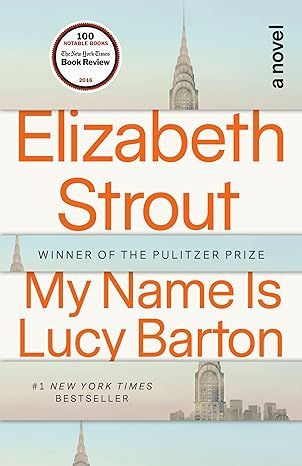My Name Is Lucy Barton: A Novel
3.8
-
36,168 ratings
#1 NEW YORK TIMES BESTSELLER • LONGLISTED FOR THE BOOKER PRIZE • A simple hospital visit becomes a portal to the tender relationship between mother and daughter in this “spectacular” (The Washington Post) novel by the Pulitzer Prize–winning author of Olive Kitteridge and The Burgess Boys.
“An aching, illuminating look at mother-daughter devotion.”—People
A BEST BOOK OF THE YEAR: Time, The Washington Post, The New York Times Book Review, NPR, San Francisco Chronicle, Minneapolis Star Tribune, St. Louis Post-Dispatch, Miami Herald, The Guardian Slate, BookPage, LibraryReads, Kirkus Reviews
Lucy Barton is recovering slowly from what should have been a simple operation. Her mother, to whom she hasn’t spoken for many years, comes to see her. Gentle gossip about people from Lucy’s childhood in Amgash, Illinois, seems to reconnect them, but just below the surface lie the tension and longing that have informed every aspect of Lucy’s life: her escape from her troubled family, her desire to become a writer, her marriage, her love for her two daughters. Knitting this powerful narrative together is the brilliant storytelling voice of Lucy herself: keenly observant, deeply human, and truly unforgettable.
Kindle
$13.99
Available instantly
Audiobook
$0.00
with membership trial
Hardcover
$7.94
Paperback
$9.69
Ships from
Amazon.com
Payment
Secure transaction
ISBN-10
0812979524
ISBN-13
978-0812979527
Print length
240 pages
Language
English
Publisher
Random House Publishing Group
Publication date
October 10, 2016
Dimensions
5.19 x 0.55 x 8 inches
Item weight
2.31 pounds
Popular highlights in this book
Lonely was the first flavor I had tasted in my life, and it was always there, hidden inside the crevices of my mouth, reminding me.
Highlighted by 4,713 Kindle readers
There is that constant judgment in this world: How are we going to make sure we do not feel inferior to another?
Highlighted by 4,464 Kindle readers
You are wasting time by suffering twice. I mention this only to show how many things the mind cannot will itself to do, even if it wants to.
Highlighted by 3,555 Kindle readers
Product details
ASIN :
B011G3HG5G
File size :
4651 KB
Text-to-speech :
Enabled
Screen reader :
Supported
Enhanced typesetting :
Enabled
X-Ray :
Enabled
Word wise :
Enabled
Editorial reviews
Amazon.com Review
An Amazon Best Book of January 2016: Do not be misled by the slimness of this volume, the quietness of its prose, the seeming simplicity of its story line: Elizabeth Strout’s My Name is Lucy Barton is as powerful and disturbing as the best of Strout’s work, including the Pulitzer Prizewinning Olive Kitteridge. In fact, it bears much resemblance to that novel-- and to Strout’s debut Amy and Isabelle--in that it deals with small-town women, who are always more complicated than they seem and often less likable than many contemporary heroines. Here, Strout tells the story of a thirtysomething wife and mother who is in the hospital for longer than she expected, recovering from an operation. She’s not dying, but her situation is serious enough that her mother-- whom she has not seen in many years-- arrives at her bedside. The two begin to talk. Their style is undramatic, gentle-- just the simple unspooling of memories between women not generally given to sharing them; still, the accumulation of detail and the repetitive themes of longing and lifelong missed connections add up to revelations that, in another writer’s heavy hands, might be melodramatic. In Strout’s they are anything but. Rarely has a book been louder in its silences, or more plainly and completely devastating. --Sara Nelson
Review
“There is not a scintilla of sentimentality in this exquisite novel. Instead, in its careful words and vibrating silences, My Name Is Lucy Barton offers us a rare wealth of emotion, from darkest suffering to—‘I was so happy. Oh, I was happy’—simple joy.”—Claire Messud, The New York Times Book Review
“Spectacular . . . My Name Is Lucy Barton is smart and cagey in every way. It is both a book of withholdings and a book of great openness and wisdom. . . . [Elizabeth Strout] is in supreme and magnificent command of this novel at all times.”—Lily King, The Washington Post
“My Name Is Lucy Barton is a short novel about love, particularly the complicated love between mothers and daughters, but also simpler, more sudden bonds. . . . It evokes these connections in a style so spare, so pure and so profound the book almost seems to be a kind of scripture or sutra, if a very down-to-earth and unpretentious one.”—Marion Winik, Newsday
“Lucy Barton is . . . potent with distilled emotion. Without a hint of self-pity, Strout captures the ache of loneliness we all feel sometimes.”—Time
“An aching, illuminating look at mother-daughter devotion.”—People
“A quiet, sublimely merciful contemporary novel about love, yearning, and resilience in a family damaged beyond words.”—The Boston Globe
“Sensitive, deceptively simple . . . Strout captures the pull between the ruthlessness required to write without restraint and the necessity of accepting others’ flaws. It is Lucy’s gentle honesty, complex relationship with her husband, and nuanced response to her mother’s shortcomings that make this novel so subtly powerful. . . . My Name Is Lucy Barton—like all of Strout’s fiction—is more complex than it first appears, and all the more emotionally persuasive for it.”—San Francisco Chronicle
“Strout maps the complex terrain of human relationships by focusing on that which is often unspoken and only implied. . . . [My Name Is Lucy Barton is] a powerful addition to Strout’s body of work.”—The Seattle Times
“Impressionistic and haunting . . . Much of the joy of reading Lucy Barton comes from piecing together the hints and half-revelations in Strout’s unsentimental but compelling prose, especially as you begin to grasp the nature of a bond in which everything important is left unsaid. . . . Strout paints an indelible, grueling portrait of poverty and abuse that’s all the more unnerving for her reticence. With My Name Is Lucy Barton, she reminds us of the power of our stories—and our ability to transcend our troubled narratives.”—Miami Herald
“Lovely and heartbreaking . . . a major work in minimalist form . . . In the character of Lucy, Strout has fashioned one of the great resilient modern heroines.”—Portland Press-Herald
“Strout has proven once again that she is a master of creating unforgettable characters. . . . Her stories open themselves to the reader in a way that is familiar and relatable, but then she delivers these zingers and we marvel at her talent.”—The Post and Courier
“Writing of this quality comes from a commitment to listening, from a perfect attunement to the human condition, from an attention to reality so exact that it goes beyond a skill and becomes a virtue.”—Hilary Mantel
“Magnificent.”—Ann Patchett
About the Author
Elizabeth Strout is the #1 New York Times bestselling author of Olive Kitteridge, winner of the Pulitzer Prize; Olive, Again, an Oprah’s Book Club pick; Anything Is Possible, winner of the Story Prize; My Name is Lucy Barton, longlisted for the Man Booker Prize; The Burgess Boys, named one of the best books of the year by The Washington Post and NPR; Abide with Me, a national bestseller; and Amy and Isabelle, winner of the Los Angeles Times Art Seidenbaum Award for First Fiction and the Chicago Tribune Heartland Prize. She has also been a finalist for the National Book Critics Circle Award, the PEN/Faulkner Award for Fiction, the International Dublin Literary Award, and the Orange Prize. Her short stories have been published in a number of magazines, including The New Yorker and O: The Oprah Magazine. Elizabeth Strout lives in New York City.
Read more
Sample
There was a time, and it was many years ago now, when I had to stay in a hospital for almost nine weeks. This was in New York City, and at night a view of the Chrysler Building, with its geometric brilliance of lights, was directly visible from my bed. During the day, the building’s beauty receded, and gradually it became simply one more large structure against a blue sky, and all the city’s buildings seemed remote, silent, far away. It was May, and then June, and I remember how I would stand and look out the window at the sidewalk below and watch the young women—my age—in their spring clothes, out on their lunch breaks; I could see their heads moving in conversation, their blouses rippling in the breeze. I thought how when I got out of the hospital I would never again walk down the sidewalk without giving thanks for being one of those people, and for many years I did that—I would remember the view from the hospital window and be glad for the sidewalk I was walking on.
To begin with, it was a simple story: I had gone into the hospital to have my appendix out. After two days they gave me food, but I couldn’t keep it down. And then a fever arrived. No one could isolate any bacteria or figure out what had gone wrong. No one ever did. I took fluids through one IV, and antibiotics came through another. They were attached to a metal pole on wobbly wheels that I pushed around with me, but I got tired easily. Toward the beginning of July, whatever problem had taken hold of me went away. But until then I was in a very strange state—a literally feverish waiting—and I really agonized. I had a husband and two small daughters at home; I missed my girls terribly, and I worried about them so much I was afraid it was making me sicker. When my doctor, to whom I felt a deep attachment—he was a jowly-faced Jewish man who wore such a gentle sadness on his shoulders, whose grandparents and three aunts, I heard him tell a nurse, had been killed in the camps, and who had a wife and four grown children here in New York City—this lovely man, I think, felt sorry for me, and saw to it that my girls—they were five and six—could visit me if they had no illnesses. They were brought into my room by a family friend, and I saw how their little faces were dirty, and so was their hair, and I pushed my IV apparatus into the shower with them, but they cried out, “Mommy, you’re so skinny!” They were really frightened. They sat with me on the bed while I dried their hair with a towel, and then they drew pictures, but with apprehension, meaning that they did not interrupt themselves every minute by saying, “Mommy, Mommy, do you like this? Mommy, look at the dress of my fairy princess!” They said very little, the younger one especially seemed unable to speak, and when I put my arms around her, I saw her lower lip thrust out and her chin tremble; she was a tiny thing, trying so hard to be brave. When they left I did not look out the window to watch them walk away with my friend who had brought them, and who had no children of her own.
My husband, naturally, was busy running the household and also busy with his job, and he didn’t often have a chance to visit me. He had told me when we met that he hated hospitals—his father had died in one when he was fourteen—and I saw now that he meant this. In the first room I had been assigned was an old woman dying next to me; she kept calling out for help—it was striking to me how uncaring the nurses were, as she cried that she was dying. My husband could not stand it—he could not stand visiting me there, is what I mean—and he had me moved to a single room. Our health insurance didn’t cover this luxury, and every day was a drain on our savings. I was grateful not to hear that poor woman crying out, but had anyone known the extent of my loneliness I would have been embarrassed. Whenever a nurse came to take my temperature, I tried to get her to stay for a few minutes, but the nurses were busy, they could not just hang around talking.
About three weeks after I was admitted, I turned my eyes from the window late one afternoon and found my mother sitting in a chair at the foot of my bed. “Mom?” I said.
“Hi, Lucy,” she said. Her voice sounded shy but urgent. She leaned forward and squeezed my foot through the sheet. “Hi, Wizzle,” she said. I had not seen my mother for years, and I kept staring at her; I could not figure out why she looked so different.
“Mom, how did you get here?” I asked.
“Oh, I got on an airplane.” She wiggled her fingers, and I knew that there was too much emotion for us. So I waved back, and lay flat. “I think you’ll be all right,” she added, in the same shy-sounding but urgent voice. “I haven’t had any dreams.”
Her being there, using my pet name, which I had not heard in ages, made me feel warm and liquid-filled, as though all my tension had been a solid thing and now was not. Usually I woke at midnight and dozed fitfully, or stared wide-awake through the window at the lights of the city. But that night I slept without waking, and in the morning my mother was sitting where she had been the day before. “Doesn’t matter,” she said when I asked. “You know I don’t sleep lots.”
The nurses offered to bring her a cot, but she shook her head. Every time a nurse offered to bring her a cot, she shook her head. After a while, the nurses stopped asking. My mother stayed with me five nights, and she never slept but in her chair.
During our first full day together my mother and I talked intermittently; I think neither of us quite knew what to do. She asked me a few questions about my girls, and I answered with my face becoming hot. “They’re amazing,” I said. “Oh, they’re just amazing.” About my husband, my mother asked nothing, even though—he told me this on the telephone—he was the one who had called her and asked her to come be with me, who had paid her airfare, who had offered to pick her up at the airport—my mother, who had never been in an airplane before. In spite of her saying she would take a taxi, in spite of her refusal to see him face-to-face, my husband had still given her guidance and money to get to me. Now, sitting in a chair at the foot of my bed, my mother also said nothing about my father, and so I said nothing about him either. I kept wishing she would say “Your father hopes you get better,” but she did not.
“Was it scary getting a taxi, Mom?”
She hesitated, and I felt that I saw the terror that must have visited her when she stepped off the plane. But she said, “I have a tongue in my head, and I used it.”
After a moment I said, “I’m really glad you’re here.”
She smiled quickly and looked toward the window.
This was the middle of the 1980s, before cellphones, and when the beige telephone next to my bed rang and it was my husband—my mother could tell, I’m sure, by the pitiful way I said “Hi,” as though ready to weep—my mother would quietly rise from her chair and leave the room. I suppose during those times she found food in the cafeteria, or called my father from a pay phone down the hall, since I never saw her eat, and since I assumed my father wondered over her safety—there was no problem, as far as I understood it, between them—and after I had spoken to each child, kissing the phone mouthpiece a dozen times, then lying back onto the pillow and closing my eyes, my mother would slip back into the room, for when I opened my eyes she would be there.
That first day we spoke of my brother, the eldest of us three siblings, who, unmarried, lived at home with my parents, though he was thirty-six, and of my older sister, who was thirty-four and who lived ten miles from my parents, with five children and a husband. I asked if my brother had a job. “He has no job,” my mother said. “He spends the night with any animal that will be killed the next day.” I asked her what she had said, and she repeated what she had said. She added, “He goes into the Pedersons’ barn, and he sleeps next to the pigs that will be taken to slaughter.” I was surprised to hear this, and I said so, and my mother shrugged.
Then my mother and I talked about the nurses; my mother named them right away: “Cookie,” for the skinny one who was crispy in her affect; “Toothache,” for the woebegone older one; “Serious Child,” for the Indian woman we both liked.
But I was tired, and so my mother started telling me stories of people she had known years before. She talked in a way I didn’t remember, as though a pressure of feeling and words and observations had been stuffed down inside her for years, and her voice was breathy and unselfconscious. Sometimes I dozed off, and when I woke I would beg her to talk again. But she said, “Oh, Wizzle-dee, you need your rest.”
“I am resting! Please, Mom. Tell me something. Tell me anything. Tell me about Kathie Nicely. I always loved her name.”
“Oh yes. Kathie Nicely. Goodness, she came to a bad end.”
We were oddities, our family, even in that tiny rural town of Amgash, Illinois, where there were other homes that were run-down and lacking fresh paint or shutters or gardens, no beauty for the eye to rest upon. These houses were grouped together in what was the town, but our house was not near them. While it is said that children accept their circumstances as normal, both Vicky and I understood that we were different. We were told on the playground by other children, “Your family stinks,” and they’d run off pinching their noses with their fingers; my sister was told by her second-grade teacher—in front of the class—that being poor was no excuse for having dirt behind the ears, no one was too poor to buy a bar of soap. My father worked on farm machinery, though he was often getting fired for disagreeing with the boss, then getting rehired again, I think because he was good at the work and would be needed once more. My mother took in sewing: A hand-painted sign, where our long driveway met the road, announced SEWING AND ALTERATIONS. And though my father, when he said our prayers with us at night, made us thank God that we had enough food, the fact is I was often ravenous, and what we had for supper many nights was molasses on bread. Telling a lie and wasting food were always things to be punished for. Otherwise, on occasion and without warning, my parents—and it was usually my mother and usually in the presence of our father—struck us impulsively and vigorously, as I think some people may have suspected by our splotchy skin and sullen dispositions.
And there was isolation.
We lived in the Sauk Valley Area, where you can go for a long while seeing only one or two houses surrounded by fields, and as I have said, we didn’t have houses near us. We lived with cornfields and fields of soybeans spreading to the horizon; and yet beyond the horizon was the Pedersons’ pig farm. In the middle of the cornfields stood one tree, and its starkness was striking. For many years I thought that tree was my friend; it was my friend. Our home was down a very long dirt road, not far from the Rock River, near some trees that were windbreaks for the cornfields. So we did not have any neighbors nearby. And we did not have a television and we did not have newspapers or magazines or books in the house. The first year of her marriage, my mother had worked at the local library, and apparently—my brother later told me this—loved books. But then the library told my mother the regulations had changed, they could only hire someone with a proper education. My mother never believed them. She stopped reading, and many years went by before she went to a different library in a different town and brought home books again. I mention this because there is the question of how children become aware of what the world is, and how to act in it.
How, for example, do you learn that it is impolite to ask a couple why they have no children? How do you set a table? How do you know if you are chewing with your mouth open if no one has ever told you? How do you even know what you look like if the only mirror in the house is a tiny one high above the kitchen sink, or if you have never heard a living soul say that you are pretty, but rather, as your breasts develop, are told by your mother that you are starting to look like one of the cows in the Pedersons’ barn?
How Vicky managed, to this day I don’t know. We were not as close as you might expect; we were equally friendless and equally scorned, and we eyed each other with the same suspicion with which we eyed the rest of the world. There are times now, and my life has changed so completely, that I think back on the early years and I find myself thinking: It was not that bad. Perhaps it was not. But there are times, too—unexpected—when walking down a sunny sidewalk, or watching the top of a tree bend in the wind, or seeing a November sky close down over the East River, I am suddenly filled with the knowledge of darkness so deep that a sound might escape from my mouth, and I will step into the nearest clothing store and talk with a stranger about the shape of sweaters newly arrived. This must be the way most of us maneuver through the world, half knowing, half not, visited by memories that can’t possibly be true. But when I see others walking with confidence down the sidewalk, as though they are free completely from terror, I realize I don’t know how others are. So much of life seems speculation.
Read more
About the authors
Elizabeth Strout
Elizabeth Strout is the author of the New York Times bestseller Olive Kitteridge, for which she was awarded the Pulitzer Prize; the national bestseller Abide with Me; and Amy and Isabelle, winner of the Los Angeles Times Art Seidenbaum Award and the Chicago Tribune Heartland Prize. She has also been a finalist for the PEN/Faulkner Award and the Orange Prize in London. She lives in Maine and New York City.
Read more
Reviews
Customer reviews
3.8 out of 5
36,168 global ratings
Marie
5
Amazingly talented writer creates an absorbing character study that is so hard to put down!
Reviewed in the United States on February 5, 2016
Verified Purchase
I LOVE Elizabeth Strout’s writing! “Olive Kitteridge” is one of my favorite books, and this reminded me of that novel in the beginning, but it was a very different kind of book. “Olive Kitteridge” is a collection of short stories which involved characters in the same town whose lives intersected, some in very major, others minor ways. This book was told by a single narrator and even though it was divided into chapters, it flowed like one continuous story. The writing is profound and soul-searching, and her characters are so deeply human. Such depth of emotion and feeling are felt while reading this.
“My name is Lucy Barton” begins with the narrator reflecting on a particular time in her life when she was hospitalized for appendicitis which becomes complicated by persistent fever following the surgery. This was a pivotal point in the a narrator’s life to reflect back on her childhood with the poverty and abuse that accompanied it and well as project forward into the future as to what she wanted from life and what was to become her life.
There is a powerful dialogue between Lucy and her mother within the hospital and during this, what goes unsaid is just as important, maybe more important than what is said. The mother tells Lucy story after story of failing marriages, but there is hardly a mention of Lucy’s father.
Sarah Payne, a character in the novel later tells Lucy of her writing about this time period: ” This is a story about love, you know that. This is a story of a man who has been tortured every day of his life for things he did in the war. This is the story of a wife who stayed with him, because most wives did in that generation, and she comes to her daughter’s hospital room and talks compulsively about everyone’s marriage going bad, she doesn’t even know it, doesn’t even know what she’s doing. This is a story about a mother who loves her daughter. Imperfectly. Because we all love imperfectly.” This quote sums of the book amazingly well. The book also speaks to memory and how we can all remember things differently. How we may choose to hide certain memories or pretend things never happened to cover up for the people we love. It is shocking towards the end, that she speaks with her brother and sister regularly and how much they choose not to speak about or ask each other about. Lucy Barton is reminded by Sarah Payne, “to go to the page without judgement” reminding her “that we never knew, and never would know, what it would be like to understand another person fully.”
Another quote from the book that I really liked: “It interests me how we find ways to feel superior to another person, another group of people. It happens everywhere, and all the time. Whatever we call it, I think it’s the lowest part of who we are, this need to find someone else to put down.” Throughout the book, Lucy feels distanced and alienated from others because of her poor upbringing. She and her family were ignored by others in town, and when she went off to college, she often felt that others made comments conveying that they were feeling superior to her circumstances. She comments to her friend, Jeremy, that she envied the men with HIV, because at least they had a community.
This book is filled with love, but also with feelings of melancholy, sadness, fear, terror, loneliness, abandonment. The characters, feelings, relationships and sentiments are described in such a real, human manner, that the book is very affecting. I highly recommend this book to anyone, but do think it would appeal more to women. It was a book that I did not want to end because I loved it so much, but it was just perfect the way it was!
For more of my book reviews, please visit http://www.book-chatter.com
Read more
11 people found this helpful
ronni
5
Excellent and lovely
Reviewed in the United States on September 23, 2024
Verified Purchase
I am looking forward to reading all the books in the series! Hopefully there will be a TV Series in the near future!
Eric Selby
5
Elizabeth Strout: A Writer's Writer
Reviewed in the United States on January 19, 2016
Verified Purchase
Elizabeth Strout: A Writer’s Writer Eric Selby Olive Kitteridge deserved the Pulitzer Prize in Literature in 2009. And were I on that committee for this year, my vote would be cast for My Name Is Lucy Barton (even though I don’t think the title is a good one for what this amazing novel offers the reader). These two Elizabeth Strout novels are both very much alike thematically but oh-so-very different, revealing just how skilled Strout is with her craft. I chuckled when, on a recent “Fresh Air” (NPR) interview with Terry Gross, the author said of Olive when asked about how she developed the character: “I just let her rip!” Indeed Olive does exactly that. But Lucy, highly traumatized from her childhood (as is everyone in that household, or so we are led to believe as we move through the novel), is so unlike Olive. Lucy is sweet, caring, a woman who sees the good in others. (Olive does occasionally as well.) Olive Kitteridge, written in third person and in a series of inter-related stories that emerge as a novel, is so unlike the first-person Lucy fictional memoir because that is what this novel is: written as a memoir. Lucy herself is a novelist—and published—and has taken a writing workshop with another well respected writer of fiction, Sarah Payne. (But should you decide to look for the books each has published, you’ll find nothing! Will Elizabeth Strout now assume those two identities and write—and publish in their names—their works?) The novel is just under 200 pages and in short chapters. Lucy Barton (her original name and we never do learn what her husband’s last name is—at least I don’t recall that we do) is a wife and mother of two daughters. Lucy, in the mid-80s and as the AIDS epidemic was emerging into public awareness, has been hospitalized for an appendectomy. But complications emerge, resulting in her being in that New York City hospital for several weeks. She can see the Chrysler Building from her bed. Her husband comes only twice to see her. And when he brings their daughters, Lucy can see that the woman who is caring for them isn’t doing a good job. But Lucy says nothing. (This woman will emerge at the end of the novel in a surprising role.) Lucy Barton loves her Big Apple life, an escape from the small Illinois town where she spent a terrible childhood, sometimes locked in her father’s truck when he and her mother were at work. One time a snake spent the day in the cab with her—and this is one of the traumas she has never conquered. Her brother slept occasionally with the pigs and wore, occasionally, women’s clothing. And then there was this issue: “What as a child I had called—to myself—the Thing, meaning an incident of my father becoming very anxious and not in control of himself.” The reader will not discover for certain what the Thing is until near the end when it becomes the central image representing what occurs in this novel. This is a family that cannot confront the abuse, the total dysfunction that has such deep roots, hence why I say the novel has a similar theme to the one the runs through Olive Kitteridge where so many characters are depressed and often suicidal. For Lucy it was the discovery of books in third grade that saved her and then propelled her into her life as an author. (Based on the interview with Terry Gross, I realize that Elizabeth Strout had a wonderful childhood, living in the home of parents who were college professors at the University of New Hampshire. She spoke so lovingly of both parents.) Lucy has not only not seenhermother since she left that little Illinois town but hasn’t heard from her either. Her mother has never seen her two New York City grandchildren, has never met their father. But suddenly she walks into Lucy’s hospital room. And there she stays for five days. Most of the novel involves what they talk about—and what they avoid talking about—during those days. But she doesn’t ever meet the granddaughters or son-in-law while in New York. The story emerges in oblique language. But not so oblique that the reader is left confused. That is the skill Lucy Barton has as a writer which, of course, means the skill the author herself has in writing this fictional memoir. Fragile and oh-so-very-sweet, Lucy is, in her words, “so happy. Oh, I was happy speaking with my mother this way.” Lucy has the ideal doctor—and she sort of falls in love with him. She has wonderful nurses for whom she and her mother select names representing their feelings toward the care takers. This is also a novel about what makes a good novelist, with this advice from Sarah Payne: “If you find yourself protecting anyone as you write [about them], remember this: You’re not doing it right.” That’s definitely the voice of the author of My Name Is Lucy Barton. As those of us who have read Olive know, Elizabeth Strout does not protect her protagonist. And she certainly doesn’t protect Lucy either. And finally this from the chapter on pages 96-99 which I think is priceless, Elizabeth Strout’s opportunity through Sarah Payne to rebuke readers who write “reader reviews” in which they confuse the author’s views with the views of the characters created by the author, those types of reviews I ignore (I just didn’t like Olive Kitteridge as a person. I wish the author made her nicer. To which I want to write—and have occasionally—Then read Heidi!)
Read more
37 people found this helpful
Top Elizabeth Strout titles
View all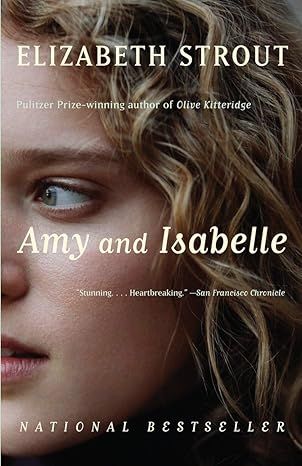
Amy and Isabelle: A novel
4.3
-
9,403
$3.34
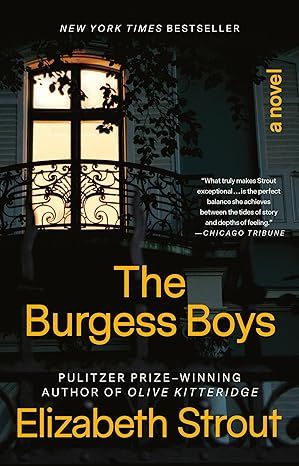
The Burgess Boys: A Novel
4.1
-
11,063
$2.11
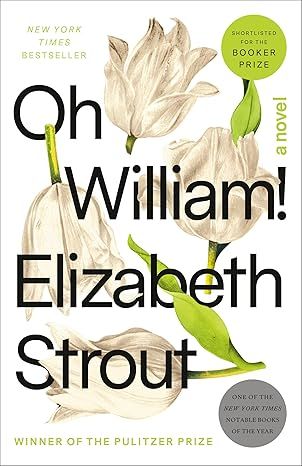
Oh William!: A Novel
4.2
-
22,498
$5.04
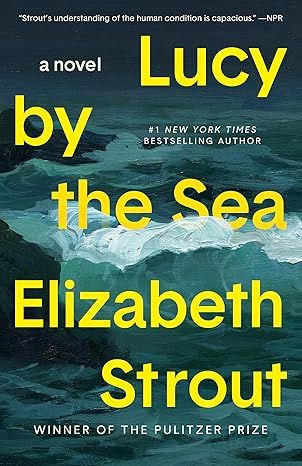
Lucy by the Sea: A Novel
4.3
-
18,461
$4.00
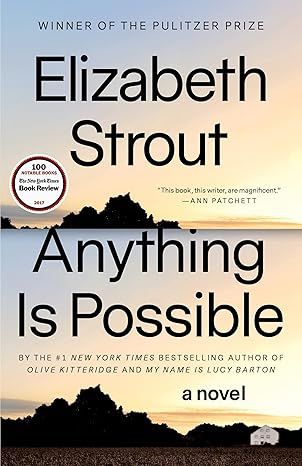
Anything Is Possible: A Novel
4
-
19,323
$5.35
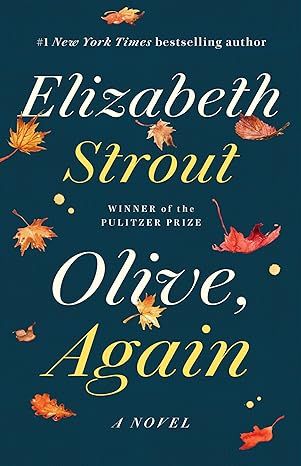
Olive, Again: A Novel (Olive, 2)
4.4
-
24,861
$9.76
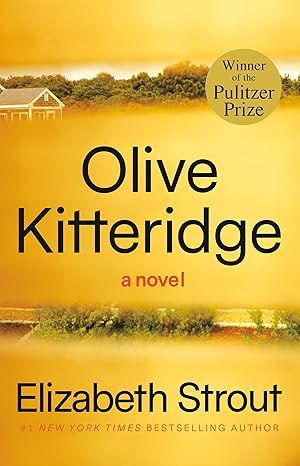
Olive Kitteridge
4.2
-
30,647
$9.49
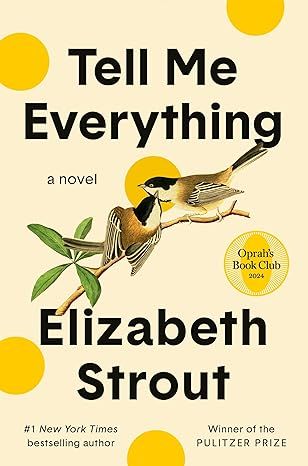
Tell Me Everything: Oprah's Book Club: A Novel
4.5
-
2,665
$14.99
Similar Books
Best sellers
View all
The Tuscan Child
4.2
-
100,022
$8.39

The Thursday Murder Club: A Novel (A Thursday Murder Club Mystery)
4.3
-
155,575
$6.33

Sapiens: A Brief History of Humankind
4.6
-
140,302
$13.49

The Butterfly Garden (The Collector, 1)
4.3
-
88,556
$9.59

Things We Hide from the Light (Knockemout Series, 2)
4.4
-
94,890
$11.66

The Last Thing He Told Me: A Novel
4.3
-
154,085
$2.99

The Perfect Marriage: A Completely Gripping Psychological Suspense
4.3
-
143,196
$9.47

The Coworker
4.1
-
80,003
$13.48

First Lie Wins: A Novel (Random House Large Print)
4.3
-
54,062
$14.99

Mile High (Windy City Series Book 1)
4.4
-
59,745
$16.19

Layla
4.2
-
107,613
$8.99

The Locked Door
4.4
-
94,673
$8.53
